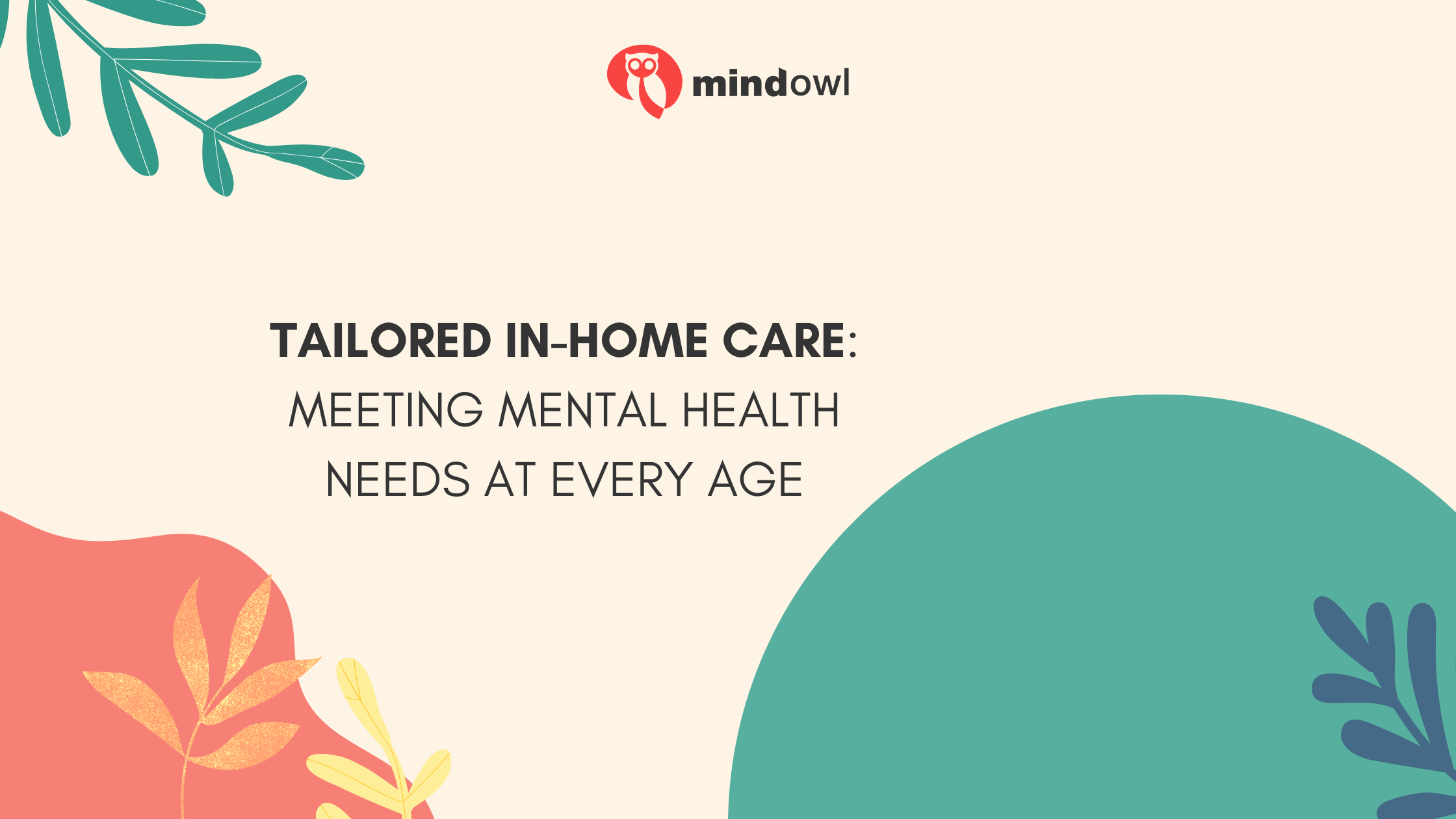Mental health is a crucial aspect of overall well-being that can significantly impact an individual’s quality of life. Unfortunately, mental health issues can affect anyone, regardless of age, gender, or background. Recognizing the importance of addressing mental health concerns promptly, tailored in-home care services have emerged as a valuable solution for individuals who require specialized care in the comfort of their own homes.
In-home care services provide personalized support to individuals struggling with mental health challenges, enabling them to receive the necessary care and assistance within the familiar surroundings of their homes. This approach not only promotes a sense of security and comfort but also allows for a more tailored and patient-centred approach to mental health care.
Let’s learn more about this topic in this article.
Mental Health Challenges Across All Ages
Mental health is a journey that spans from the earliest days of childhood to the golden years of old age. Every stage of life presents its own unique challenges and obstacles, requiring tailored approaches and unwavering support. Let’s delve into the diverse mental health needs that individuals face at various stages of life and how in home care services can provide a compassionate and personalized solution.
A Nurturing Environment For Children
A child’s mental well-being is the foundation upon which their future is built. These formative years are crucial for developing emotional resilience, self-confidence, and healthy coping mechanisms. In-home care services can create a nurturing environment that embraces a child’s emotional needs, providing personalized attention, age-appropriate guidance, and engaging activities tailored to their developmental stage.
Caregivers who are trained in child psychology and development can be a valuable asset in this journey. They possess the expertise to identify potential mental health concerns early on, such as anxiety, behavioral issues, or learning difficulties. By addressing these challenges promptly, caregivers can prevent them from escalating into more severe issues that could hinder a child’s growth and development.
Adolescent Mental Health: Navigating Turbulent Years
The teenage years can be a whirlwind of change, filled with physical, emotional, and social transitions that can test even the most resilient of individuals. It’s a time when mental health challenges can emerge or intensify, making this period particularly vulnerable.
In-home care services can provide a safe haven for teenagers navigating these turbulent waters. Caregivers who specialize in adolescent psychology can offer a non-judgmental ear, providing counseling and coping strategies tailored to the unique challenges teenagers face. From peer pressure and self-esteem issues to academic stress and family dynamics, these caregivers can help young individuals develop resilience and healthy coping mechanisms to weather the storm.
Adulthood: Balancing Mental Health And Responsibilities
As individuals step into adulthood, they often find themselves juggling a myriad of responsibilities – careers, relationships, finances, and life transitions. This delicate balancing act can take a toll on mental well-being, leading to challenges such as anxiety, depression, and burnout.
In-home care services can be a lifeline for adults seeking to maintain a healthy work-life balance and promote overall well-being. Caregivers can provide practical support, such as assisting with household tasks or running errands, alleviating some of the daily pressures that can contribute to stress and overwhelm.
Additionally, caregivers can introduce stress management techniques and coping strategies tailored to the individual’s needs and lifestyle. Whether it’s mindfulness practices, time management skills, or simply having a supportive presence to lean on, in-home care services can be a valuable resource for adults navigating the complexities of modern life.
The Golden Years: Preserving Dignity And Independence
As individuals enter their golden years, they may face a unique set of mental health challenges. Loneliness, cognitive decline, and age-related conditions like dementia or Alzheimer’s disease can significantly impact their quality of life and independence.
In-home care services can be a lifeline for seniors, offering companionship, cognitive stimulation, and specialized care tailored to their unique needs. Caregivers can assist with daily activities, ensuring that seniors maintain a sense of independence and dignity while receiving the support they require.
Moreover, caregivers can provide emotional support and a listening ear, helping seniors cope with the challenges that come with ageing. By creating a safe and familiar environment, in-home care services can foster a sense of comfort and security, promoting overall mental well-being for seniors.

Tailored Approaches For Specific Mental Health Concerns
While mental health challenges can manifest across all ages, certain conditions may require more specialized care and support.
1. Anxiety Disorders: Creating A Calming Environment
For individuals struggling with anxiety disorders, their home environment can play a crucial role in managing symptoms. In-home care services can help create a calming and stress-free atmosphere by minimizing triggers, implementing relaxation techniques, and providing emotional support during moments of distress. Caregivers can also assist with practical tasks, reducing the burden of daily responsibilities that may exacerbate anxiety.
2. Depression: Encouraging Engagement And Motivation
Depression can be a debilitating condition that saps energy and motivation. In-home care services can provide the necessary support and encouragement to help individuals engage in activities they once enjoyed, fostering a sense of purpose and accomplishment. Caregivers can offer companionship, facilitate social interactions, and gently motivate individuals to participate in hobbies or pursue interests that bring joy and fulfilment.
3. Substance Abuse And Addiction: A Supportive Recovery Journey
Recovering from substance abuse or addiction can be a challenging process that requires a supportive and stable environment. In-home care services can provide individuals with the necessary structure, accountability, and emotional support throughout their recovery journey. Caregivers can assist with daily routines, monitor progress, and ensure a substance-free living space, fostering a conducive environment for lasting sobriety.
4. Post-Traumatic Stress Disorder (PTSD): Promoting Healing And Resilience
Individuals suffering from PTSD often experience intense emotional distress and may struggle with everyday tasks. In-home care services can offer a safe and secure environment where individuals can feel comfortable and supported as they work through their trauma. Caregivers trained in trauma-informed care can provide coping strategies, facilitate access to therapies, and create a peaceful atmosphere conducive to healing and resilience.

The Benefits Of In-Home Mental Health Care
In-home care services offer numerous advantages for individuals seeking mental health support, ensuring a personalized and comprehensive approach to their well-being.
1. Continuity Of Care: Fostering Trust And Familiarity
One of the significant benefits of in-home care services is the continuity of care they provide. Caregivers can establish long-term relationships with individuals, fostering trust and familiarity. This consistent presence allows for a deeper understanding of the individual’s needs, preferences, and progress, enabling more effective and tailored care.
2. Personalized Attention: Addressing Unique Needs And Preferences
Every individual has unique needs, preferences, and circumstances that shape their mental health journey. In-home care services offer personalized attention, tailoring their approach to each person’s specific requirements. Caregivers can adapt their strategies, activities, and support based on the individual’s age, condition, and personal preferences, ensuring a truly customized experience.
3. Comfort And Familiarity: Promoting A Sense Of Security
The familiarity and comfort of one’s own home can play a significant role in promoting mental well-being. In-home care services allow individuals to receive the support they need while remaining in a familiar and secure environment. This sense of familiarity can reduce stress, anxiety, and disorientation, creating a nurturing atmosphere conducive to healing and recovery.
4. Family Involvement: Strengthening Support Systems
Mental health challenges can impact not only the individual but also their loved ones. In-home care services encourage family involvement, fostering collaboration and open communication. Caregivers can provide guidance and support to family members, empowering them to play an active role in their loved one’s care journey. This approach strengthens support systems and promotes a holistic approach to mental well-being.
Choosing The Right In-Home Care Provider
When seeking in-home care services for mental health needs, it’s essential to find a reputable and experienced provider that can meet your specific requirements. Here are some factors to consider:
1. Qualifications And Training Of Caregivers
Caregivers providing mental health support should have specialized training and qualifications in psychology, counselling, or mental health nursing. Look for providers that prioritize ongoing education and professional development for their caregivers, ensuring they stay up-to-date with the latest best practices and techniques in mental health care.
2. Tailored Care Plans: Addressing Individual Needs
A reputable in-home care provider should offer personalized care plans tailored to each individual’s unique needs, preferences, and goals. They should conduct thorough assessments and work closely with the individual and their loved ones to develop a comprehensive care plan that addresses all aspects of mental well-being.
3. Compassionate And Patient-Centered Approach
When it comes to mental health care, a compassionate and patient-centred approach is essential. Look for providers that prioritize empathy, respect, and non-judgmental attitudes in their caregivers. They should be committed to building trusting relationships and creating a safe and supportive environment for individuals to express their needs and concerns.
4. Ongoing Monitoring And Adjustments
Mental health needs can be dynamic and may change over time. Choose an in-home care provider that offers regular monitoring and adjustments to the care plan as needed. This ensures that the individual’s evolving needs are consistently met and that the care provided remains effective and relevant.
Conclusion
Tailored in-home care services offer a compassionate and personalized approach to meeting mental health needs at every age. By providing specialized care in the comfort and familiarity of one’s own home, individuals can receive the support they need while maintaining their sense of independence and dignity. With a focus on continuity, personalization, and family involvement, in-home care services can play a crucial role in promoting overall well-being and fostering a nurturing environment for mental health recovery and resilience.
MindOwl Founder – My own struggles in life have led me to this path of understanding the human condition. I graduated with a bachelor’s degree in philosophy before completing a master’s degree in psychology at Regent’s University London. I then completed a postgraduate diploma in philosophical counselling before being trained in ACT (Acceptance and commitment therapy).
I’ve spent the last eight years studying the encounter of meditative practices with modern psychology.

